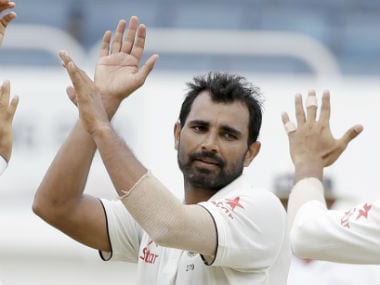India vs Sri Lanka: Hosts' struggle on Wankhede pitch underlines familiar problems against bounce and seam
The Mumbai T20I served a reality check to India’s batsmen. On a similar pitch, the likes Dale Steyn, Morne Morkel, Kagiso Rabada and Vernon Philander would have been a formidable threat.
Vedam Jaishankar, Dec, 25 2017
- Sri Lanka in India, 3 T20 International Series, 2017 IND Vs SL India beat Sri Lanka by 5 wickets
- West Indies in New Zealand, 3 ODI Series, 2017 NZ Vs WI New Zealand beat West Indies by 204 runs
- Sri Lanka in India, 3 T20 International Series, 2017 IND Vs SL India beat Sri Lanka by 88 runs
- Sri Lanka in India, 3 T20 International Series, 2017 IND Vs SL India beat Sri Lanka by 93 runs
- West Indies in New Zealand, 3 ODI Series, 2017 NZ Vs WI New Zealand beat West Indies by 5 wickets
- West Indies in New Zealand, 3 ODI Series, 2017 NZ vs WI - Dec 26th, 2017, 03:30 AM IST
- The Ashes, 2017/18 AUS vs ENG - Dec 26th, 2017, 05:00 AM IST
- Zimbabwe in South Africa, Only Test, 2017 SA vs ZIM - Dec 26th, 2017, 05:00 PM IST
- West Indies in New Zealand, 3 T20I Series, 2017/18 NZ vs WI - Dec 29th, 2017, 07:30 AM IST
- West Indies in New Zealand, 3 T20I Series, 2017/18 NZ vs WI - Jan 1st, 2018, 11:30 AM IST
| Rank | Team | Points | Rating |
|---|---|---|---|
| 1 | India | 4969 | 124 |
| 2 | South Africa | 3767 | 111 |
| 3 | England | 4497 | 105 |
| 4 | New Zealand | 3489 | 100 |
| 5 | Australia | 3294 | 97 |
| Rank | Team | Points | Rating |
|---|---|---|---|
| 1 | South Africa | 6386 | 120 |
| 2 | India | 6680 | 119 |
| 3 | Australia | 5948 | 114 |
| 4 | England | 6156 | 114 |
| 5 | New Zealand | 5559 | 111 |
| Rank | Team | Points | Rating |
|---|---|---|---|
| 1 | Pakistan | 2843 | 124 |
| 2 | India | 3385 | 121 |
| 3 | New Zealand | 1925 | 120 |
| 4 | West Indies | 2395 | 120 |
| 5 | England | 2029 | 119 |





About the only time India’s batsmen did not have to worry about the bounce and seam movement of the Wankhede Stadium pitch was during the last ball of the penultimate over of the match. The experienced Sri Lankan paceman, Nuwan Pradeep, took those two variables out of the equation by bowling a full toss, which Dinesh Karthik gleefully dispatched into the stands to ease India towards victory.
Sri Lanka's bowler Dushmantha Chameera (3rd R) celebrates the wicket of Manish Pandey in Mumbai on Sunday. AFP
Until that moment, on a pitch refreshed by dew and thus aiding seam movement and bounce, India’s batsmen were struggling. It was a rare sight. From openers KL Rahul and Rohit Sharma to Karthik and Mahendra Singh Dhoni, all batsmen were put thorough a thorough examination. They almost made a mess of the small target of 135 before a generous Pradeep bailed them out with the full toss.
So what was different this time around? In fact, barring that Dharamsala One-Day International (ODI) which Sri Lanka won by seven wickets, this was the first time the home team was put under the cosh on this tour. The surprising aspect was that it came within a couple of days of that momentous effort of 260 for 5 against the same opponents at the Holkar Stadium in Indore.
True, the Mumbai pitch had a fair amount of bounce even earlier, when the Lankans batted. But what brought flavour to the contest was the seam movement facilitated by the dew. Suddenly, batting was not as easy as it was in Indore. The ball was seaming, swinging, bouncing, and occasionally skidding, making batting an onerous task.
Amidst the mounting panic, it was Manish Pandey’s approach that was most fascinating to follow. Instinctively, he did not commit himself to the front foot, but hung back. This allowed him to play late. The medium pacers’ relatively lack of pace permitted him to adjust and keep out deliveries that seamed back. Anything that did not jag back at him went beside him. This gave him the necessary room to use the bat like a bludgeon.
Some deliveries he flat-batted to the off, others to mid-wicket. The fact that he didn't get behind the line of the ball helped him immensely. His bat speed and willingness to throw the weight of his body behind the shots was terrific. To confound the bowlers, he occasionally went on the front foot to throw them off their length.
His short but impressive innings was terminated by another delivery that cut into him and beat the arc of his descending bat. But he had done very well by that time.
Batsmen from the sub-continent are not quite used to playing on bouncy tracks, and they take time to adjust and come up with counter measures. The biggest problem is the use of wrist, which Indian batsmen in particular are adept at. The wristy strokes, such as flick, are taken out of the equation when the ball bounces above the waist. Batsmen who execute the square cut or pull shot with a fair degree of consistency have a better chance of scoring on bouncy pitches.
Of course, it is unlikely that any South African pitch will seam as prodigiously as the Mumbai one over five days. There may be seam movement on the opening day or early on other mornings. The bounce, though, will be higher than say, the Indore pitch. Generally though, batsmen can trust the bounce and adjust their techniques accordingly.
It is here that the importance of the Mumbai T20I clash needs to be emphasised. It served a reality check to India’s batsmen. The manner in which Dushmanta Chameera, Dasun Shanaka, Thisera Perera and even Nuwan Pradeep troubled them and were difficult to score off should have brought the high-flying batsmen down to earth with a thud.
On a similar pitch, the likes Dale Steyn, Morne Morkel, Kagiso Rabada and Vernon Philander would have been a formidable threat.
Thus it is imperative that the ten days from now until the first Test starts in Cape Town — which, thankfully, has lower bounce and more turn than any other South African pitch — are utilised to get a grip on greater bounce. The batsmen and bowlers need to get to terms with it very quickly.
The Mumbai T20I has proved that there is no time to be lost. In that sense, Sri Lanka might well have done India a big favour by competing so fiercely in the last fixture.
Published Date:Dec 25, 2017
| Updated Date: Dec 25, 2017
Also See
India vs South Africa: Graeme Smith says Virat Kohli, Cheteshwar Pujara will be key against a potent Protea attack
India vs Sri Lanka, Indore T20I: Rohit Sharma unleashed a more lethal version of his batting in decimation of visitors
India vs Sri Lanka: Skipper Rohit Sharma says hosts' performance in 1st ODI an 'eye opener' for team